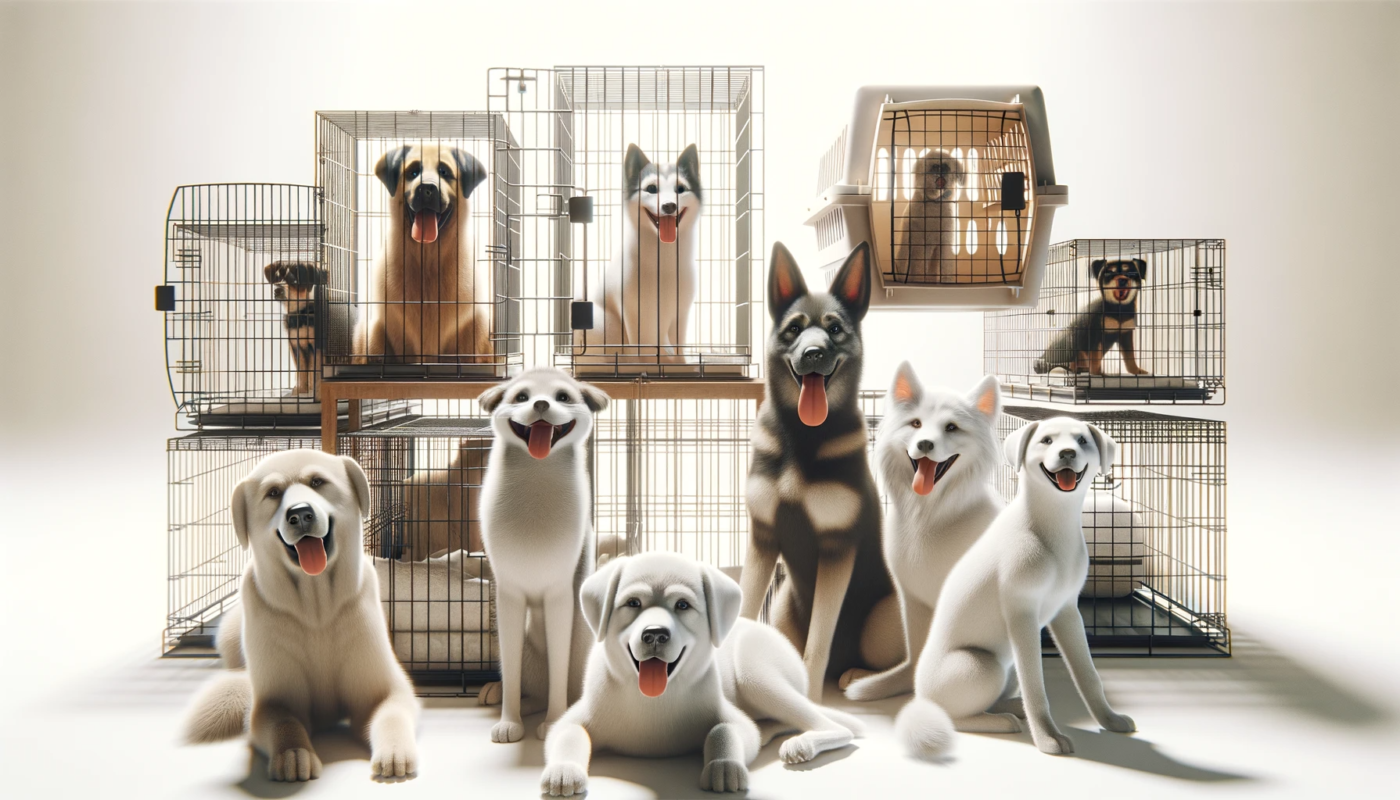
How to Measure for a Soft-Sided Dog Crate
So you’ve decided to get a soft-sided dog crate for your furry buddy, but now comes the important part: measuring for the perfect fit. Whether you’re planning to use it for traveling or as a cozy den at home, ensuring the right size is crucial for your dog’s comfort and safety. In this article, we’ll guide you through the simple steps of measuring for a soft-sided dog crate, so you can make the best choice for your beloved pet.

This image is property of images.pexels.com.
Find products like these on Amazon!
1. Understanding the Importance of Proper Crate Size
When it comes to providing a safe and comfortable space for your furry friend, choosing the right size crate is crucial. A soft-sided dog crate offers a cozy and secure environment for your dog, but if it’s too small or too big, it can lead to anxiety, stress, and discomfort. Therefore, it’s important to understand the significance of proper crate size and how it can benefit your canine companion.
1.1 Preventing Anxiety and Stress
Dogs are den animals by nature, and a crate serves as their own personal den where they can find solace and relaxation. However, if the crate is too small, it can make your dog feel confined and trapped, leading to increased anxiety and stress. This can manifest in various behavioral issues such as excessive barking, whining, destructive chewing, and even aggression. By providing a crate that is appropriately sized for your dog, you can prevent these issues and create a calm and secure space for them.
1.2 Promoting Safety and Comfort
Another important aspect of proper crate sizing is ensuring the safety and comfort of your dog. A crate that is too big may give your dog too much space, which can lead to accidents inside the crate as they may eliminate in one corner and rest in another. On the other hand, a crate that is too small can cause discomfort and even physical injuries if your dog is unable to stretch or move around comfortably. By selecting the right size crate, you can ensure your dog’s safety and create a cozy environment that promotes relaxation and good sleep.
2. Measuring Your Dog for a Soft-Sided Crate
Now that you understand the importance of proper crate size, let’s dive into how you can measure your dog to ensure the perfect fit for a soft-sided crate. There are several key measurements to take into consideration to ensure that the crate you choose will accommodate your dog comfortably.
2.1 Measuring the Length
To measure the length of your dog, start by placing one end of a measuring tape at the tip of their nose and extend it all the way to the base of their tail. Make sure the tape is straight and not twisted for accurate results. Note down the measurement in inches, as this will help you determine the minimum length requirement for the crate.
2.2 Measuring the Height
The next measurement to take is the height of your dog. Have your dog stand upright and measure from the floor up to the tallest point on their body, usually the top of their head or the highest point of their back (whichever is higher). Again, record the measurement in inches to determine the minimum height requirement for the crate.
2.3 Measuring the Width
To measure the width of your dog, place the measuring tape across the widest part of their body, typically around their chest or shoulders. Ensure the tape is snug but not too tight. Record the measurement in inches as this will help you determine the minimum width requirement for the crate.
2.4 Considering Your Dog’s Weight
While measurements for length, height, and width are essential, it’s also important to take your dog’s weight into consideration when choosing the right size crate. Different soft-sided crates have weight limits that are designed to ensure the structural integrity of the crate and the safety of your dog. Make sure to refer to the manufacturer’s guidelines regarding weight limits before making your final decision.
Find products like these on Amazon!
3. Selecting the Right Size Crate Based on Your Measurements
Now that you have accurately measured your dog, it’s time to select the right size crate based on those measurements. Here are a few steps to guide you through the process:
3.1 Analyzing the Measurements
Take a closer look at the measurements you obtained for your dog’s length, height, and width. Consider which measurements are the largest and use that as a reference when choosing the crate size. It’s crucial to prioritize the largest measurement to avoid any discomfort or lack of space for your furry friend.
3.2 Checking the Crate Size Guidelines
Refer to the manufacturer’s guidelines for the soft-sided crate you’re interested in purchasing. Most manufacturers will provide a sizing chart that correlates the measurements you took with the recommended crate size. Pay close attention to these guidelines and choose a crate that falls within the recommended range for your dog’s measurements.
3.3 Adjusting for Growth or Age
If your dog is a puppy or still growing, it’s important to consider their future size and adjust the crate size accordingly. While you don’t want to choose a crate that is too large, leaving too little room for growth can result in having to purchase a new crate sooner than anticipated. Consider the potential growth of your dog and select a crate size that allows for comfort in the present while also accommodating their future size.
4. Additional Factors to Consider
In addition to your dog’s measurements, there are a few other factors to consider when selecting the right size soft-sided crate:
4.1 Considering Your Dog’s Behavior and Preferences
Every dog is unique, and their behavior and preferences should be taken into account when choosing a crate size. If your dog enjoys stretching out or likes to sleep in different positions, it may be more comfortable for them to have a larger crate. Conversely, if your dog prefers a cozy and enclosed space, a slightly smaller crate may make them feel more secure.
4.2 Evaluating Storage and Portability
Consider your lifestyle and needs when it comes to storage and portability. If you frequently travel with your dog, a crate that is collapsible and easy to transport may be preferable. Additionally, if you have limited storage space in your home, a crate that can be easily folded and stored away when not in use can be a practical choice.
4.3 Checking for Escape-Proof Features
If your dog is an escape artist or tends to be more energetic and mischievous, choosing a crate with escape-proof features can provide you with peace of mind. Look for crates that have secure zippers, reinforced stitching, and sturdy materials to ensure your dog stays safely inside their crate.

This image is property of images.pexels.com.
5. Trying Out Different Crate Sizes
Sometimes, it can be challenging to determine the perfect crate size for your dog without actually seeing them inside the crate. Here are a few suggestions to help you make the best decision:
5.1 Consulting with a Veterinarian or Pet Expert
If you’re still unsure about the appropriate crate size for your dog, consider reaching out to a veterinarian or a pet expert. They can provide valuable guidance based on their experience and knowledge of different dog breeds and sizes.
5.2 Borrowing or Renting Crates
Another option is to borrow or rent crates of different sizes before making a permanent purchase. By trying out different crate sizes with your dog, you can observe their behavior and comfort levels to help guide your decision-making process.
5.3 Observing Your Dog’s Behavior inside the Crate
Pay close attention to your dog’s behavior when you place them inside the crate. Do they seem relaxed and content, or do they appear cramped and restless? Your dog’s behavior can give you valuable insights into whether the crate size is suitable for them.
6. Making the Final Decision
Now that you have considered all the necessary factors, it’s time to make your final decision on the size of your soft-sided dog crate. Here are a few key points to help you make the best choice:
6.1 Taking Into Account your Dog’s Comfort and Behavior
Ultimately, your dog’s comfort and behavior should be the top priority. Choose a crate size that allows them to comfortably stand, turn around, and lie down, while also considering their personal preferences for a cozy and secure space.
6.2 Considering Your Lifestyle and Needs
Take into consideration your lifestyle and needs when it comes to storage, portability, and travel. Select a crate size that aligns with your lifestyle, ensuring that it is easily stored and transported as required.
6.3 Assessing the Durability and Quality of the Crate
Don’t forget to assess the durability and quality of the soft-sided crate you choose. Look for well-constructed crates made of sturdy materials that can withstand wear and tear, ensuring your dog’s safety for the long run.

This image is property of images.pexels.com.
7. Conclusion
In conclusion, choosing the right size for a soft-sided dog crate is vital for your dog’s well-being and happiness. By preventing anxiety and stress, promoting safety and comfort, and considering additional factors such as behavior and preferences, storage and portability, and escape-proof features, you can ensure that your dog has the perfect sanctuary in their crate.
Remember to accurately measure your dog’s length, height, and width, and take their weight into account when selecting the ideal crate size. By trying out different crate sizes, consulting with professionals, and observing your dog’s behavior, you’ll be able to make an informed decision.
By prioritizing your dog’s comfort and behavior, considering your lifestyle and needs, and assessing the durability and quality of the crate, you can provide your furry friend with the ideal soft-sided dog crate that suits their individual needs. With the right approach, you can create a safe and comfortable space that they’ll love to call their own.
Find products like these on Amazon!




-
-
13 mins
Tagged Choosing, cleaning, dog crate, Pet care